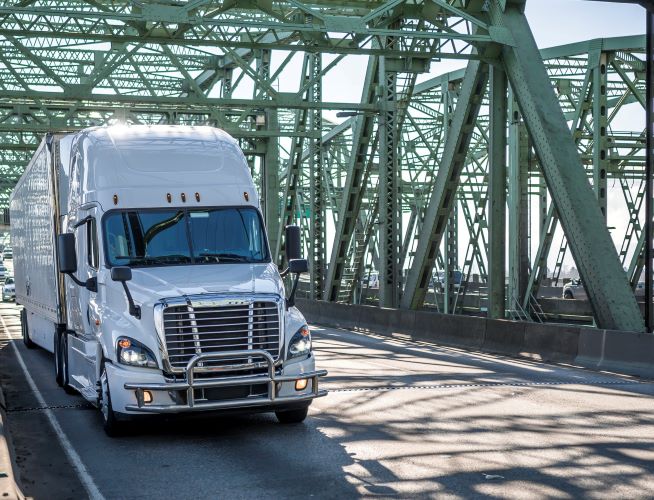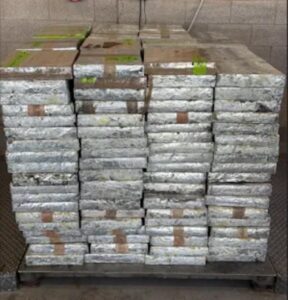The stories from owner-operators about low freight rates abound.
Tony Filla commented on The Trucker’s Facebook page, “The bottom dropped out. They’re (carrier customers) not shipping, so there went 60% of my long-distance freight out the window.”
Filla usually hauls rebar and other fabricated products on a flatbed trailer. Due to the reduction in loads, he’s now working in his carrier’s local fleet making shorter regional runs. Under normal operating conditions, he would use load boards to pick up a return load from a broker, but the rates are so low that he is deadheading back, adding that he is “surviving for now” and has no desire to haul freight for “free.”
Kevin Kocmich is doing a little better.
“I’m not going backwards,” he said. “Times are tough now, but my income hasn’t dropped too much.”
In March, Kocmich was named the 2019 Owner-Operator of the Year by the Truckload Carriers Association. He is leased to Diamond Transportation System (DTS), which assigns oversize loads received from its contract customers. Kocmich depends on brokers to supplement the loads he receives from DTS.
“Rates are down, but so is fuel, at least 25%,” Kocmich said.
His advice to struggling owner-operators is to know their costs of doing business.
“You gotta know the numbers of your business,” he said. “How can you protest when you don’t even know your own numbers?”
Kocmich isn’t planning to join any organized protests.
“I stay kind of neutral,” he said. “I agree on some stuff and disagree on some.”
He was clear about how protests should be conducted, however.
“I don’t think they should be slowing traffic and getting the police involved,” he stated.
Norita Taylor, media spokesperson for OOIDA, talked numbers, too.
“Know your cost of operations. Know your customers,” she said. “And, always, safety first.”
While Taylor did not express support for any particular protest, she was supportive of the rights of the participants.
“Our general take on any protest is that everybody has the right to legally protest,” she explained. “We wouldn’t support blocking roads and that sort of activity, but we support their right to protest so long as they do it legally and safely.”
OOIDA, Taylor explained, doesn’t take an official position on broker rates paid to carriers, but the organization does support brokers providing electronic records to owner-operators as soon as the haul is completed. The group also supports waiving both Heavy Vehicle Use Tax (HVUT) and Unified Carrier Registration (UCR) fees for 2020.
Jeff Hopper, vice president and chief marketing officer at DAT, recommended that owner-operators pay particular attention to rates.
“Rates are negotiated between broker or shipper and the carrier,” he said. “The best time to address rates is in the negotiation process.”
Hopper vehemently denied recent publicity that claimed DAT sets broker rates.
“DAT does not set rates. All rates are negotiated between the parties involved,” he said. “We believe the DAT load board is the largest public marketplace for loads in the country.”
That status as “the largest public marketplace” provides lots of data that can be useful.
“We use anonymized data to identify trends in rates, regional activity and other factors,” Hopper continued. “We use past data to report on what’s happening in the market currently and also to forecast what we think will happen in the future.”
Owner-operators and brokers who are subscribers to DAT can use the information found there, including summary reports produced by DAT, to determine average rates that they can then apply to their own loads. Hopper was clear, however.
“We do not take a percentage of revenue and we certainly don’t set rates,” he said.
Responding to suggestions that owner-operators cancel their subscriptions to DAT, Hopper said, “It’s everyone’s right to do so, but they’ll lose access to a lot of loads as well as information that helps them make good business decisions.”
Good business decisions are especially critical when freight rates are down.
“We should remember that we’ve never really seen an event with such an economic impact,” Hopper said. “There’s just not enough loads. After an initial surge for groceries, shippers aren’t shipping.”
The general malaise that has impacted the trucking industry is worldwide, and other industries are also feeling the pain. On April 29, the U.S. Department of Commerce Bureau of Economic Analysis (BEA) announced an adjustment in the First Quarter 2020 U.S. Gross Domestic Product (GDP) to -4.8%. Most economists define a recession as two or more consecutive quarters of negative growth. Considering that major business closures didn’t take place until April, the beginning of the second quarter, it’s very likely that second-quarter GDP statistics will fit solidly into negative territory.
Personal income has also declined, according to BEA, falling 3.1% in March alone. With skyrocketing unemployment, the April numbers aren’t expected to improve.
FTR’s “Monday Morning Coffee” blog for April 27 presented some dire numbers. Orders for Advance Durable Goods such as cars, computers and other products dropped 14.4% in March and are expected to fall again in April. Total shipments fell 4.5%. FTR predicted that business investment will likely be weak for the rest of 2020, harming productivity.
There’s little doubt in anyone’s mind that it is difficult to do business in the current economy.
Companies of all sizes are struggling to stay in operation. A sad reality is that recessionary conditions can cause weaker players to drop out of the market. Most carriers, including owner-operators, benefited from the plentiful freight and higher rates of 2018 and the first half of 2019. The market is tougher now. Some trucking businesses, especially smaller ones, will not survive this economy.
Claims of broker malfeasance — and plans to physically protest it — can be debated.
Are economic problems faced by independent owner-operators caused, at least in part, by broker profiteering, as protest organizers claim? Are current conditions, the supply and demand that governs trucking and every other market, entirely to blame? What share of the blame, if any, do the small-business owners who chose to invest in trucking deserve? And, what can be done to increase each carrier’s chances to survive what is now generally accepted to be an economic recession?
We’ll address some of those questions in tomorrow’s series wrap-up.
Editor’s note: This story is the second installment of a series. Check TheTrucker.com tomorrow for another installment about the owner-operators’ issues and upcoming protests.
Cliff Abbott is an experienced commercial vehicle driver and owner-operator who still holds a CDL in his home state of Alabama. In nearly 40 years in trucking, he’s been an instructor and trainer and has managed safety and recruiting operations for several carriers. Having never lost his love of the road, Cliff has written a book and hundreds of songs and has been writing for The Trucker for more than a decade.









One solution to start is transparency.
Place the rate on BOL, and Refuse low paying loads.